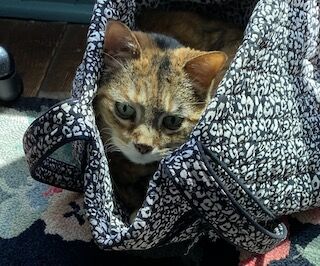Imagination
Imagining Mothers on Mother's Day
Mothers come in many forms.
Posted May 5, 2022 Reviewed by Lybi Ma
Key points
- Sometimes we have to reinvent ourselves as we celebrate Mother's Day.
- Love is always evolving. It's never too late to become a mother to ourselves and others.
I used to dread Mother’s Day. I didn’t really have a mother and I didn’t get to be a mother, and the thought of a beautiful Sunday in May devoted to mothers gave me ferocious FOMO. I spent the day itself thinking about how everyone but me was doing something lovely and fun with their families and their mothers.
“Why didn’t you have a mother?” my friend Louise asked when I was telling her about this lately. “Everybody has a mother.”
I explained that my mother had mental illness when I was born, possibly postpartum psychosis, although that was never diagnosed. I did not bond with her, I think this is common, and I was afraid of her: There were screaming, shouting, life-threatening incidents when I was an infant and toddler. Her mental illness was never treated, later, she suffered from alcoholism and borderline personality disorder.
My fear of my mother was the central fact of my life until I was well into my twenties when she died. I lived with a family down the road on and off during most of my childhood because of it. I couldn’t see around the edges of it, couldn’t see my mother in any way that was separate from it. She almost certainly didn’t see me either. My best guess is that she projected the parts of herself she hated onto me. When she saw me when I was 26 after an eight-year hiatus, she said to my father afterward, as if she was shocked and deeply surprised, “Mary’s a beautiful well-adjusted girl!”
There’s probably a link between my failure to see or be seen by my mother and my failure to become a mother. Once when I was teaching a class in my house, holding a kitten on my lap as I was looking down a long table—the kitten was Marigold, who lives with me to this day—one of my students, a friend, said, “It’s such a shame you never had kids.” As if that was an accident in my life and not something that grew up so deeply out of my psychology it never even presented itself as a possibility. That friend had two kids, and I wondered what it was in her that made having children possible, what made being a mother an ordinary achievable goal in her imagination. And what made it not one in mine.
I never got married. I dated plenty of men but I never had a partner I was involved with long enough or stably enough to consider having children with them. But mostly I never felt grown-up enough to have children. I continued to feel like a child myself, maybe because the child part of me was always front and center, demanding attention, needing to be healed.
All the mothering I would have given children of my own leaked out the sides, with other people’s children, friends, and small helpless animals. I’ve been a kind of mother to my cats, to my ex’s kids and my friends’ kids, to countless people I’ve sponsored or mentored, including the many students and coaching clients whose deep longing to write and writing projects I’ve nurtured as a teacher and coach. I’ve mothered boyfriends or tried to, usually not the best idea but sometimes hard to resist. I’ve felt motherly toward practically everything in the world, the lost kittens my friend fosters for the animal shelter, baby bunnies I’ve tried to rescue, even the mice that wandered one by one into my house one year—I captured them in a salad spinner and carried them to the end of the street instead of snapping their necks or poisoning them.
Maybe it was the motherless child in me that tried to save all those lost kittens and mice and depressed boyfriends, that she was really trying to rescue her own lost little-girl self. Maybe we’re all doing that without knowing it, at least those of us who didn’t have much in the way of mothers.
My friend Honor suggested I try imagining a mother for myself, and I did try, but I found it practically impossible. I concluded that I was so separate from the idea of having a mother when I was a kid, that there was no mother at all in my imagination.
My friend Michael, who had limited experience with having a mother himself, told me his idea of what mothers are like: They’re protective; they instill values in you and they live the values themselves; they try to make you feel better when you’re hurt in one way or another. And, he said, if all a mother did was give birth to you, you owe your life to that. Because of that, unless you hate your life, a mother can’t be anything but positive.
I had to agree. It made me try again to imagine a mother for myself. This time I came to the conclusion that the mother I could picture and would like to have, would be myself. I know that I would be, would have been a good mother. There’s plenty of evidence—all those mice, bunnies, friends, other people’s children.
And I’ve done my best to be a mother to myself. I’ve spent years working on healing my child self in any way I can and I’ve been pretty successful doing that. But I still haven’t learned how to be a mother to myself. Maybe there is no real way to do that, or maybe it requires an act of imagination that’s practically impossible, for me, at least.
Even harder than learning how to mother myself has been accepting other people’s attempts to mother me. There have been many people in the role of substitute mother in my life over the years, but I’ve always kept them at arm’s length. In my experience, trust is an amazingly hard thing to achieve. The traumas of the past keep getting in the way.
It’s only been recently, and only with certain people, that I’ve been able to genuinely trust enough to receive someone’s motherly comforting and hugs.
Mother’s Day no longer feels to me like something only for other people, an event I’m painfully left out of. I’ve been finding small ways to celebrate, like spending time with the foster kittens at my friend’s house.
And sometimes lately, at random times, I find myself imagining my way into a posthumous relationship with my mother. I picture her face and talk to her in my head. The connection is only imaginary, but somehow it still feels real.





